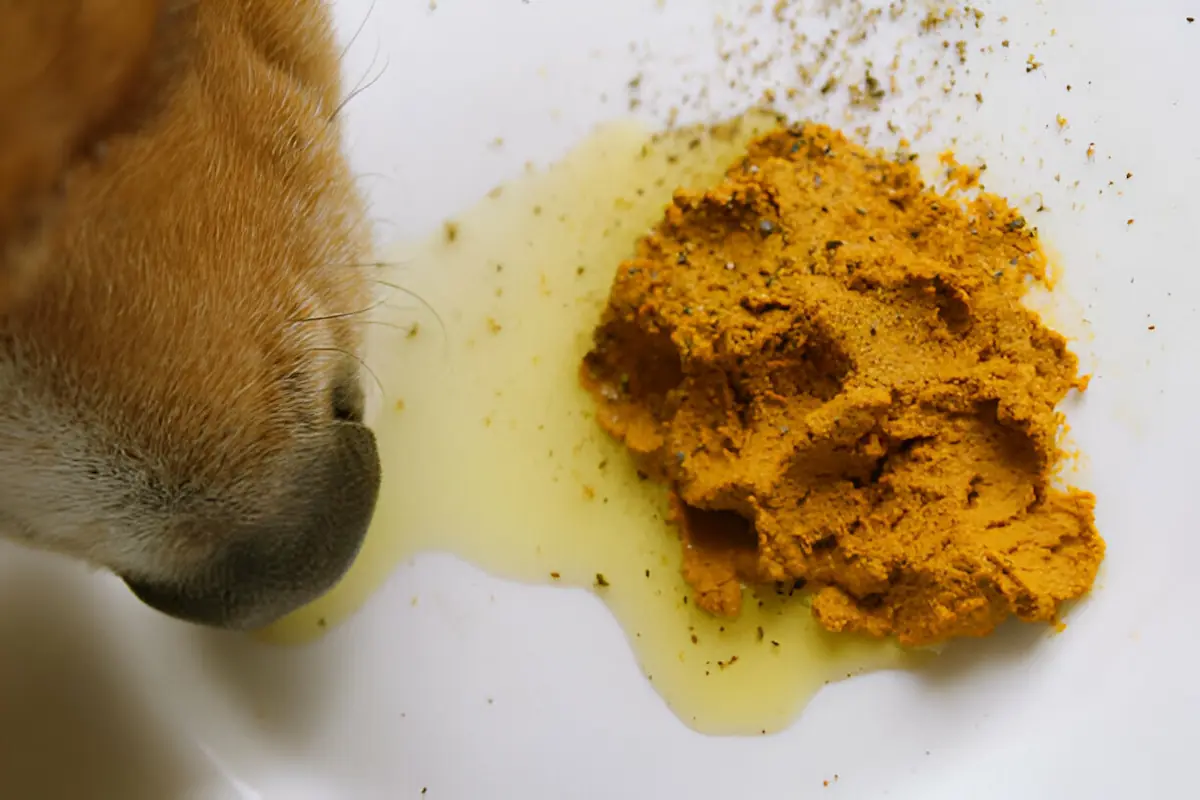turmeric for dogs: People trying to cure their dogs’ pain often ask, “Is turmeric good for dogs?” The answer is mostly yes.
What is Turmeric?

Turmeric is an Asian plant from the ginger family. The powder obtained from this plant is often used by chefs in various Asian cuisines, currrpm, sauces, and soups to add color or flavor to a dish. Turmeric is also commonly used in prepackaged foods for humans and pets as a color and flavor enhancer. The spice has a characteristic earthy taste and a rich, dark yellow color.
The active ingredient in turmeric is called curcumin, and numerous studies have shown its benefits, including its anti-inflammatory properties and promoting good joint health.
The scientific name for turmeric is Curcuma longa, which may also appear on labels.
Our experts evaluate the benefits of turmeric for dogs and whether it is a good option as a supplement for dogs.
Can dogs eat turmeric?

Turmeric is safe for dogs in small doses and can have positive effects. One study showed that curcumin, a commonly studied phytonutrient in turmeric, may support healthy mobility and joint comfort.
“Turmeric has been used in humans for years and has gained popularity in the pet supplement space,” says Purina nutritionist Karina Carbo-①ohnson, MS. In fact, she says, “Everroots Brain Health Chewables contain turmeric root powder as an active ingredient.”
Turmeric may be listed as an ingredient on your dog’s food label. Its purpose is to improve the color and/or taste of kibble, but not to provide anti-inflammatory benefits.
It turns out that the amounts of turmeric used in coloring or flavoring dog food probably have no obvious health benefits. Although turmeric is safe for dogs to consume in small amounts, they likely won’t see the anti-inflammatory benefits the spice is advertised for in humans by eating it in dog food.
Related: Can dogs eat salt and vinegar chips?
What other dog supplements can support joint health?
Can dogs eat turmeric? Yes. Other ingredients may provide more substantial anti-inflammatory benefits, such as the omega-3 fatty acids from fish oil. “Fish oil is an excellent source of omega-3 and 6 fatty acids, which have anti-inflammatory properties,” says Carbo-⑤ohnson.
“Your dog’s complete and balanced dog food contains omega-3 fatty acids,” she explains, and many dog foods use ingredients like salmon as an omega-3 source. Before introducing any supplements into your dog’s diet, be sure to speak to your veterinarian.
What are the benefits of turmeric for your dog?

Possible benefits of turmeric for dogs include:
- Helps maintain healthy cartilage and connective tissue
- Helps with occasional joint stiffness
- Fights free radicals
- Helps maintain a normal and healthy inflammatory response
How much turmeric should you give your dog?
The easiest way to give your dog turmeric is with a supplement designed specifically for dogs. In the form of a nutritional supplement, it is already correctly dosed according to your dog’s weight and needs.
When looking for a supplement, always do your research, consult your veterinarian, and buy from a company you know and trust. Look for the National Animal Supplement Council (NASC) seal of quality so you know the product has been rigorously tested for ingredient quality and manufacturing practices.
What are the side effects of turmeric for dogs?
As with anything new you give your pet, you should be aware of the possible side effects. Possible side effects of dietary supplements containing turmeric include vomiting and diarrhea.
You can reduce the chance of these side effects occurring by giving your dog the supplement with meals or after eating.
If you notice your dog has joint pain, moves more slowly or with stiffness, or shows other signs of discomfort, a supplement containing turmeric can help eliminate free radicals and relieve pain.
Conclusion
Turmeric can be a wonderful addition to your dog’s diet, offering numerous health benefits from reducing inflammation to boosting overall well-being. As with any supplement, it’s important to start slowly, monitor your dog’s response, and consult with a veterinarian to ensure it’s the right choice for your furry friend.
FAQs
Can all breeds of dogs take turmeric?
Most breeds can benefit from turmeric, but it’s always best to consult with your vet, especially if your dog has specific health conditions.
How quickly can I see the benefits of turmeric in my dog?
Benefits can vary, but some dogs may start showing improvements in as little as a few weeks.
How much turmeric can you give a dog?
The recommended dose of turmeric for dogs is 15 mg to 20 mg per pound of body weight per day, or more simply 1/8 to 1/4 teaspoon per day per 10 pounds of body weight. This is a rough starting point, but from there you can increase the amount to about a tablespoon for larger dogs.
Do vets recommend turmeric for dogs?
Yes, turmeric for dogs is safe, especially when used correctly, approved by a veterinarian, and in the correct dosage. In fact, the medicinal properties of turmeric increase the dog’s well-being and help solve various health problems. To ensure responsible use of turmeric, pet owners should consult their trusted DVMS.
Is turmeric safe in dog food?
Turmeric is safe for dogs in small doses and can have positive effects. One study showed that curcumin, a commonly studied phytonutrient in turmeric, may support healthy mobility and joint comfort.
What are the side effects of turmeric for dogs?
As with anything new you give your pet, you should be aware of the possible side effects. Possible side effects of dietary supplements containing turmeric include vomiting and diarrhea. You can reduce the chance of these side effects occurring by giving your dog the supplement with meals or after eating.
Can I use turmeric powder for cooking for my dog?
Yes, turmeric powder is a common form used in dog diets. Just ensure it’s pure and free from additives.
Are there any specific conditions that turmeric helps with?
Turmeric is particularly beneficial for inflammatory conditions, joint issues, and digestive problems.
How should I store turmeric for my dog?
Store turmeric in a cool, dry place, away from direct sunlight to maintain its potency.
vet-recommended turmeric for dogs
how to give turmeric to dogs
turmeric for dogs reviews
turmeric for dogs recipe
turmeric for senior dogs

